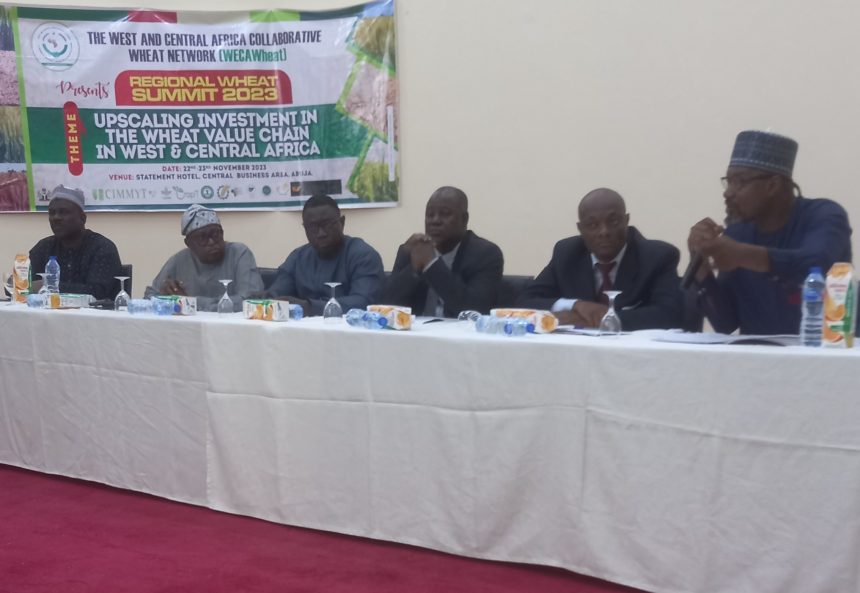by Grace Semudara
Despite spending over 3billion on Importing Wheat in 2022, Nigeria, like other countries in West and Central Africa are unable to meet local demands, experts and stakeholders meeting at the 2023 West and Central Africa Collaborative Network (WECAWHEAT) summit have revealed.
The meeting has, however, been told that with proper deployment of good science and education backed knowledge, the region could become a global wheat hub.
According to various speakers at the meeting, West Africa has an agro-ecology that is supportive of wheat production, pointing out that countries like Nigeria with tradition of wheat farming in the region sub-region must innovate new ways of leapfrogging some of the challenges that have hindered it from making the best of the advantages that nature has bestowed on them.
Prof. Benjamin Ubi, Regional Network Coordinator of the West and Central Africa Collaborative Wheat Network (WECAWheat) who alluded to this at the WECAWheat regional wheat summit 2023 held in Abuja said, “In Nigeria alone, the demand for wheat stands at 5.78 million metric tonnes, while the yearly production hovers around 160,000 metric tonnes, resulting in a staggering deficit of 92.2 per cent. The economic repercussions of this deficit are significant, with Nigeria spending well over $3 billion on wheat imports in 2022,” he said.
“Drawing inspiration from Brazil’s success story in achieving wheat self-sufficiency, the summit aims to leverage the growing political will in member-countries and the support of international partners for wheat sector transformation,” Ubi added.
He stated that wheat cultivation is not new in the sub-regions, particularly in northern Nigeria, which has a long history of planting, coupled with the favourable micro-ecologies in Cross River, Plateau and Adamawa states.
The coordinator explained that globally, wheat plays a crucial role in ensuring food security, income generation and wealth creation, stressing that the escalating demand for the produce in West and Central Africa had led to a significant gap between supply and demand.
Drawing inspiration from recent global events such as Russian , Ukraine war and Indians wheat export banned, in his remark the Minister of Agriculture and Food Security, Abubakar Kyari lamented the external volatilities which pose threat to food and and nutrition security in the nation.
While calling for an urgent collective acceleration of wheat production in the west and central Africa region, Kyari said, “Our region particularly Nigeria, both in the history of wheat production especially in the northern part of the country agroecologist exist for competitive wheat production and adopting sustainable regenerating agriculture is key to addressing the challenges pose by external factors. ”
He added that a multi-disciplinary and coordinated approach that encompasses effective crop management research, robust research system, well developed support system and government policies support is essential.”
The minister disclosed that the government of Nigeria has planned to take advantage of the dry season to cultivate 133 thousand hectares of wheat from 15 wheat producing states. To this effect, the government has imported about 6,600 metric tons wheat seeds from Mexico, and source about 5,500 metric tons locally.
Meanwhile, the coordinator of this year’s WECAWheat Summit has said it hopes to drawing inspiration from Brazil’s success story in achieving wheat self-sufficiency to leverage the growing political will in member-countries with the support of international partners to transform the wheat sector.
Earlier, the National President of the All Farmers Association of Nigeria (AFAN), Arc Kabir Ibrahim had called for collective responsibility in mitigating the high cost of wheat products.
He advised that more should be done in advancing knowledge on the wheat crop and it seamless potentials to family meals in Nigeria.
“Prior to this situation, every household just use to keep bread on the table. Nobody cared about it, children will even play with it. But today not many household can buy bread and give to their children. The issue is for Agriculture to be upscaled in Nigeria we need knowledge, and innovation,” Ibrahim said.
He also noted that there is the need to apply good science as well as a depploy a lot of education and knowledge into wheat production, saying that is the only way the country and the continent could be weaned of its dependence of the West for its wheat supply.





